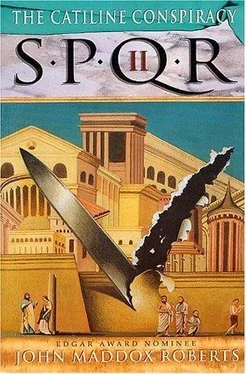John Roberts - The Catiline Conspiracy
Здесь есть возможность читать онлайн «John Roberts - The Catiline Conspiracy» весь текст электронной книги совершенно бесплатно (целиком полную версию без сокращений). В некоторых случаях можно слушать аудио, скачать через торрент в формате fb2 и присутствует краткое содержание. Жанр: Исторический детектив, на английском языке. Описание произведения, (предисловие) а так же отзывы посетителей доступны на портале библиотеки ЛибКат.
- Название:The Catiline Conspiracy
- Автор:
- Жанр:
- Год:неизвестен
- ISBN:нет данных
- Рейтинг книги:3 / 5. Голосов: 1
-
Избранное:Добавить в избранное
- Отзывы:
-
Ваша оценка:
- 60
- 1
- 2
- 3
- 4
- 5
The Catiline Conspiracy: краткое содержание, описание и аннотация
Предлагаем к чтению аннотацию, описание, краткое содержание или предисловие (зависит от того, что написал сам автор книги «The Catiline Conspiracy»). Если вы не нашли необходимую информацию о книге — напишите в комментариях, мы постараемся отыскать её.
The Catiline Conspiracy — читать онлайн бесплатно полную книгу (весь текст) целиком
Ниже представлен текст книги, разбитый по страницам. Система сохранения места последней прочитанной страницы, позволяет с удобством читать онлайн бесплатно книгу «The Catiline Conspiracy», без необходимости каждый раз заново искать на чём Вы остановились. Поставьте закладку, и сможете в любой момент перейти на страницу, на которой закончили чтение.
Интервал:
Закладка:
"After spending my days at the treasury, a gathering of cobblers would look inviting." I tried to sound petulant, an attitude that does not come naturally to me.
"Oh, that sort of work doesn't suit you, Decius?" She sounded honestly solicitous.
I shrugged. "Everybody knows it's the job given to the quaestores who lack influence in high places."
Her eyebrows went up. "With your family?"
"That's just the problem. There are so many of us that one more Metellus at the bottom of the political ladder scarcely rates a pat on the back. If you want to know the truth, the old men of the family think the high offices are theirs by right and they don't want to see any ambitious young kinsman coming along to challenge them."
She flashed me a brief, calculating look, then took a cup from a passing slave to cover it. "And I suppose you've gotten yourself into debt fulfilling your duties?" This seemed an odd comment, but it sounded promising. I had only borrowed from my father, but many penurious politicians ruined themselves trying to support the requirements and dignity of office.
"Head over heels," I told her. "Paving the high roads isn't cheap, I've found. I'm not certain I'll even be able to run for aedile with all the cost that entails."
"But surely," she said, "you've been offered a good posting when you leave office, someplace where there are opportunities for a bright, wellborn man? Many a proquaestor or legatus comes home rich and ready to stand for the higher offices even if he wasn't born wealthy." She watched me closely.
"That's what I was hoping, but nothing's been offered me so far, and it will be many years before a profitable war comes along. Pompey's cronies have all the good postings sewn up." I thought I might be laying it on too thick and changed the subject. "But who knows? Something may well turn up. Now, Sempronia, who is here aside from the usual hangers-on?"
"Let me see…" She scanned the room. "There is young Catullus. He's recently arrived in the city from Verona."
"The poet?" I said, having heard the name. He was supposed to be the leading light of the "new poets." I preferred the old ones.
"Yes, you must meet him." She took my arm and dragged me over to the young man's side. I was amazed to see that he could not have been older than nineteen or twenty. Sempronia made the introductions. He was slightly diffident, still obviously a little overwhelmed at being in the high life of the great city and trying to cover it with a confident pose bordering on arrogance. "I hear great things about your work," I said. "Meaning you haven't read them. Just as well, I feel that my best work is ahead of me. I am embarrassed to look at my earlier writing now."
"What are you working on now?" asked Sempronia, knowing that poets rarely like to talk about anything except their art.
"I am laboring over a series of love poems in the Alexandrian fashion. That is one reason why I was happy to be invited here tonight. I have always admired the Alexandrian school of Greek verse." The other reason was a chance for a free meal, I thought. I was not being disparaging in this, having been in the same position many, many times myself. Before we turned him over to his literary admirers, he asked me a question.
"Your pardon, but are you a relative of Metellus Celer, the praetor?"
"He is a cousin of my father, but that doesn't mean I know him well. Throw a rock into the Curia, and chances are good that you'll hit a Metellus." He laughed at the witticism, and I could see him filing it away for use in a political lampoon. That was all right with me. I had stolen it from an acquaintance.
"Why was he curious about Celer?" I asked Sempronia when we were alone in a garden. She leaned close and spoke conspiratorially.
"Didn't you know? He's in love with Clodia!"
"Really? She and Celer have only been married for eight months. Isn't it early for an intrigue?"
"Well, you know Clodia." Indeed I did, all too well. She was a woman about whom I had decidedly mixed feelings. "Actually," Sempronia went on, "I think he just worships her from afar, writes love lyrics to her, that sort of thing. She's flattered, as who wouldn't be?"
"But you think it's nothing more than that?" I said, cursing myself for even caring. She shot me another evaluating glance.
"Dear Clodia hasn't let marriage interfere with her social activities," she said, "she's as wild as ever. But since she has married, she has been extremely discreet where men are concerned. I think she is being faithful, within her limits."
Well, how could I blame a sensitive young poet for being in love with Clodia? I certainly had been, at one time. We were strolling by a rather graceful shrine to Isis when we encountered a man surrounded by the Egyptian staff, including Lisas. He wore the tunic of an eques, but they treated him with the fawning deference usually reserved for kings. He saw Sempronia, smiled, and walked from his circle of Egyptians, who parted for him as if he were preceded by a hundred lictors. He was a tall, fine-looking man of middle years whose clothes were of a quality I could only envy, although he wore no jewelry except for the plain gold ring of his rank. This, I learned, was Caius Rabirius Postumus, a famous banker and son of that elderly, distinguished Senator whom Caesar had tried to prosecute for a crime almost forty years past. I now understood the deference of the Egyptians. Although I had never met him, it was known that Postumus had lent huge sums to Auletes.
"Decius Caecilius," he said after we had exchanged the usual pleasantries, "did I not hear that you discovered the body of my friend Oppius this morning?"
"I merely happened by. He was your friend?"
"We had a number of business dealings. He was a part of the banking community. I was terribly shocked when I heard of the murder."
"Did he have enemies?" I asked him.
"Just the ones that bankers always have. He was a quiet family man, no political ambitions or intrigues I ever heard about."
"Then it was probably a debtor," I said.
"That would make little sense," Postumus said. "He had heirs, business associates, others who will surely assume any outstanding accounts. Believe me, if the death of a creditor canceled debts, none of us bankers would be alive tomorrow. Not all debtors are as reasonable as King Ptolemy."
"How is that?" Sempronia asked.
"He has named me minister of finance to the kingdom."
"He can use one," I noted. "I have never been able to understand how the king of the richest nation in the world can be so poor."
"It's amazing, isn't it?" he agreed. "Perhaps it's because Egypt hasn't been a true nation since the days of the pharaohs, hundreds of years ago. Nothing but conquerors since then. The Macedonians are just the most recent."
"There hasn't been a worthwhile Macedonian since Alexander," I opined, the wine sharpening my wit. "And he didn't amount to much. What does it take to beat Greeks and Persians, after all? Still, they were perfectly good barbarians while they were up in their mountains. A couple of generations after Alexander, what are they? Lunatics and drunkards, growing more degenerate with each inbred generation."
"Shame on you two!" Sempronia said. "Speaking that way about the man whose wine you are drinking."
"When Alexander was romping all the way to India," I said, "Rome was a little Italian town fighting other Italian towns. Now we're master of the world, and we didn't need any boyish god-king to accomplish it, either."
She took my arm and steered me toward the dining room. "It's time to get some food into you, Decius. I believe I hear dinner being announced."
That sounded good to me. All this learned discourse had sharpened my appetite. The rest of the evening passed pleasantly, but something nibbled at the edges of my admittedly sodden consciousness like a mouse nibbling a crust of bread. It was something Postumus had said, but I could not bring it into full clarity. The party was too full of attractions to let it bother me for long.
Читать дальшеИнтервал:
Закладка:
Похожие книги на «The Catiline Conspiracy»
Представляем Вашему вниманию похожие книги на «The Catiline Conspiracy» списком для выбора. Мы отобрали схожую по названию и смыслу литературу в надежде предоставить читателям больше вариантов отыскать новые, интересные, ещё непрочитанные произведения.
Обсуждение, отзывы о книге «The Catiline Conspiracy» и просто собственные мнения читателей. Оставьте ваши комментарии, напишите, что Вы думаете о произведении, его смысле или главных героях. Укажите что конкретно понравилось, а что нет, и почему Вы так считаете.










